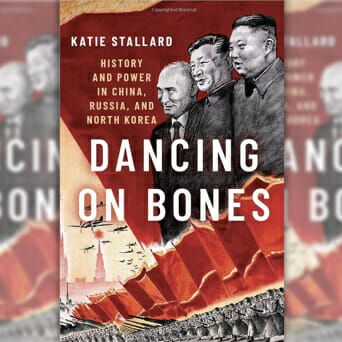On Wednesday, September 14, the Asia Policy Program is hosting Katie Stallard, Global Fellow at the Wilson Center and Senior Editor of China and Global Affairs at the New Statesman, to discuss her latest release, Dancing on Bones: History and Power in China, Russia and North Korea. This talk will be moderated by Dr. Sheena Chestnut Greitens, director of the Asia Policy Program and Associate Professor at the LBJ School of Public Affairs, at RLP 1.302B, Robert L. Patton Hall at 12:15 PM. This event is cosponsored by the Center for East Asian Studies and the Center for Russian, East European and Eurasian Studies. The Asia Policy Program is a joint effort of the Clements Center for National Security and the Strauss Center for International Security and Law.
History didn’t end. Democracy didn’t triumph. America’s leading role in the world is no longer assured. Instead, autocrats and populist strongmen are on the rise, and the global order established after 1945 is under attack. This is the phenomenon Katie Stallard tackles in Dancing on Bones, as she examines how the leaders of China, Russia, and North Korea manipulate the past to serve the present and secure the future of authoritarian rule.
Russia has annexed Crimea, started a war in eastern Ukraine, and repeatedly massed troops on its borders. China has stepped up war games near Taiwan and militarized the South China Sea, while North Korea has resumed missile testing and blood-curdling threats against the United States. These three states consistently top lists of threats to US and European security, and yet the leaders of all three insist that it is their country that is threatened, rewriting history and exploiting the memory of the wars of the last century to justify their actions and shore up popular support. Since coming to power, Xi Jinping has almost doubled the length of China’s World War II, Vladimir Putin has elevated the memory of the Great Patriotic War to the status of a national religion, and Kim Jong Un has invested vast sums in rebuilding war museums in his impoverished state, while those who try to challenge the official version of history are silenced and jailed. But this didn’t start with Putin, Xi, and Kim, and it won’t end with them.
Drawing on first-hand, on-the-ground reporting, Dancing on Bones argues that if we want to understand where these three nuclear powers are heading, we must understand the stories they are telling their citizens about the past.
BIOGRAPHY
Katie Stallard is Senior Editor for China and Global Affairs at the New Statesman and author of the book Dancing on Bones: History and Power in China, Russia and North Korea, published by Oxford University Press. She has written for Foreign Policy, The Diplomat, Asan Forum and others, and appeared as an analyst for multiple media outlets.
Previously based in Russia and China as a foreign correspondent for Sky News, she has reported from more than twenty countries to date, covering conflicts, natural disasters, and some of the world’s most repressive regimes. From Beijing, she reported extensively on North Korea, traveling to Pyongyang, the DMZ, and the China-North Korea border, and covering multiple missile and nuclear tests. As well as covering Chinese domestic politics, she travelled out into the disputed waters of the South China Sea and to the front line of the battle for the southern Philippines city of Marawi, where she reported under sniper fire from ISIS-linked militants.
During her time in Russia, she led the channel’s coverage of the crisis in Ukraine, covering the Maidan revolution in Kyiv, the annexation of Crimea, and the subsequent conflict in eastern Ukraine.



